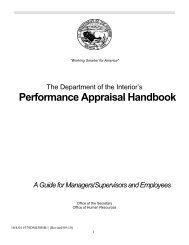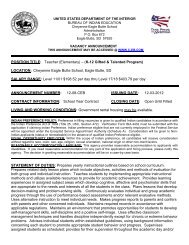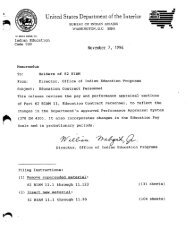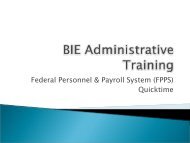collective bargaining agreement contract between - Bureau of Indian ...
collective bargaining agreement contract between - Bureau of Indian ...
collective bargaining agreement contract between - Bureau of Indian ...
Create successful ePaper yourself
Turn your PDF publications into a flip-book with our unique Google optimized e-Paper software.
Article 34Negotiation and SupplementationSection 1. GeneralSupplemental <strong>agreement</strong>s to the Master Agreement may only be negotiated in accordance with theprovisions <strong>of</strong> this Article. In order to maintain a constructive relationship, negotiations will be conductedin the most expeditious manner possible through the procedures <strong>of</strong> this Article. Supplemental<strong>agreement</strong>s shall not duplicate, conflict with, or otherwise be inconsistent with the Master Agreement.When a conflict arises, that part <strong>of</strong> the supplemental <strong>agreement</strong> shall be null and void.Section 2. Interest Based BargainingThe parties agree to use the techniques <strong>of</strong> interest-based <strong>bargaining</strong> where appropriate.Section 3. National Level NegotiationsA. Except as provided in Section 4 below, Management shall furnish written notice <strong>of</strong> a proposedsubstantive change affecting conditions <strong>of</strong> employment to the Union President or designee. Suchnotice shall include the proposed implementation date or a reasonable estimate <strong>of</strong> the date withrevisions as they are made. Notice shall be given the Union at least twenty-one (21) work daysprior to implementation unless the <strong>Bureau</strong> is not given sufficient notice from higher authority toallow it to meet such time frames or, if, an exigency <strong>of</strong> the public business exists. The UnionPresident or designee will have reasonable time to review the proposal. Telephone calls may beused to clarify or redefine issues or proposals. However, it is the parties’ obligation to negotiateshould the Union so request. Should the Union request negotiations upon the proposedchange(s), the parties will meet in accordance with provisions <strong>of</strong> 5 USC, Chapter 71 and thisAgreement.B. The Union will provide written proposals within ten (10) work days <strong>of</strong> the receipt or within ten(10) work days <strong>of</strong> the next Labor-Management Relations (LMR) meeting, whichever isappropriate, unless the parties mutually agree to extend these time frames.Negotiations may be held at other times and proposals will be provided at a mutually acceptabletime to meet a Management need for expeditious implementation. The parties will negotiate for aperiod not to exceed 40 hours. The number <strong>of</strong> Union negotiators on travel and per diem and<strong>of</strong>ficial time shall not exceed the number <strong>of</strong> Management negotiators on <strong>of</strong>ficial time. If theissue(s) remain unresolved the parties shall use the services <strong>of</strong> a mediator. Should mediation failto resolve the issue(s), final <strong>of</strong>fers by each Party shall be submitted to the Federal ServiceImpasses Panel (FSIP). If Management determines that an exigency <strong>of</strong> the public business exists,the parties recognize Management’s right to implement the change, but such change will besubject to the third party procedures.123

















